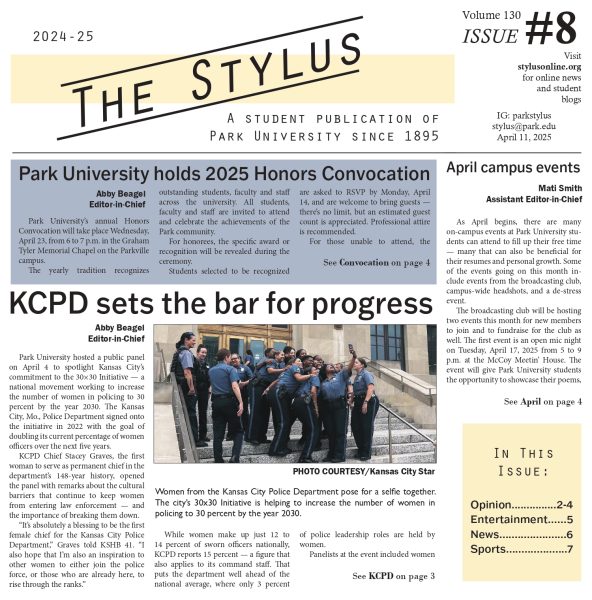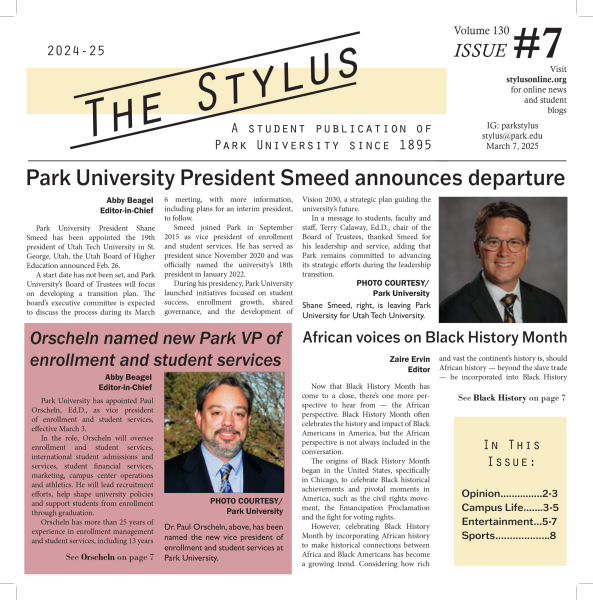Flu hits Park community, Midwest hard this winter
Amid this wacky Midwest weather, the cold and flu season has hit the area hard.
As students go to class, practice or events, they might notice fellow students, faculty and staff cancelling classes or not coming to class or practice.
This lower attendance is actually in the best interest of spreading illnesses.
“The clinic hasn’t been that busy but the cold and flu season has been rampant,” said Janet James, adult nurse practitioner at the Meritas Clinic on the Park University Parkville campus. “The majority of people that I have seen have cold and sinus situations. I have only had a few that I felt like were truly the flu. Only a few have had the flu. I haven’t had an abundance of those people.”
If you don’t want to get a cold or flu there are some simple steps that can be integrated into your daily life.
The number one prevention is hand washing, according to the Centers for Disease Control. You should wash your hands and use hand sanitizer after touching public surfaces such as keyboards and computer mice found in campus technology labs.
You should also try not to sneeze or cough into your hands but into your elbow. Your hands touch many surfaces throughout the day so just like preventing getting sick by washing after touching public surfaces, you can prevent spreading sickness to others.
An overall healthy lifestyle is one of the best ways to keep bacteria and viruses from creeping in and wreaking havoc on the immune system.
“They actually did a study that using a fist bump or half hug is the best way to keep from getting sick,” said James.
But the best way to prevent getting and spreading bacteria and viruses is to simply stay home if you are feeling ill. James said people should not put others at risk when experiencing cold and flu symptoms.
“We need to stay healthy, we need to practice good prevention measures and stay home,” she said. “Don’t go to school don’t go to work if you have flu symptoms.”
James also said getting the flu shot can help with preventing certain strains of the flu.
“The CDC says that the flu vaccine is the number one way to keep from getting the flu,” she said. “Even though the flu that is most prevalent this year was not included in the vaccine, it is still protective and makes your likelihood of having such a severe case this year less likely.
“The flu vaccine offered this year covered only four strains. The most prevalent this year is H3N2 and was not covered in the flu shot.”
The Park University faculty and staff’s insurance provider arranged for flu shots to those wanting them.
Unfortunately, due to the way the vaccines are ordered only some students were able to receive the flu shots on campus.
Flu shots are available through most walk-in clinics and other local health clinics.
James also shed some light on the vaccine for those who worry about getting the flu once they receive the vaccine.
“Be reassured that the flu vaccine is a dead virus and will not make you sick,” she said. “If you do have flu symptoms after receiving the flu vaccine, more than likely, it was because someone had been exposed to the flu through human contact prior to receiving the vaccine.”
There are some notable differences between a cold and the flu. Colds generally last three to 10 days and someone will have a bit of a sore throat, slight cough and darker nose drainage, whereas the flu comes on quicker and you feel sick.
According to the CDC’s website, flu symptoms include a fever or feeling feverish, a cough, sore throat, runny or stuffy nose, muscle or body aches, headaches and fatigue. Some people may also have vomiting and diarrhea, though this is more common in children than adults.
If you have those symptoms you should go to a medical facility to get tested. You should also inform the clinic of the symptoms you have so they can either give you a mask or take you to a different room.
This is a preventative measure so you cannot infect others. The flu can be very complicated for those who are elderly, those with other health issues or are young in age.
The CDC mentions the complications could include, “bacterial pneumonia, ear infections, sinus infections, dehydration and worsening of chronic medical conditions, such as congestive heart failure, asthma or diabetes.”
Another aspect to be mindful of is there is a difference between bacteria and viruses.
Bacteria, which cause infections, can be treated with antibiotics whereas viruses cannot. The flu is a virus and cannot be treated with antibiotics.
There is a product that is antiviral, which can be used if the flu is caught within 48 hours. While it does not cure the patient of the flu, it does help them recover faster.
“A lot of times we don’t want to prescribe antibiotics because we don’t want these super bugs coming around and we don’t have any drugs to kill them,” said the CDC website. “But the Tamiflu that is not for bacterial it’s for viral infections they are saying even before you get that positive test back that yes this is the flu, they want you started on that to help get you over that sooner to prevent worsening illnesses.
“People get comorbidity problems, because if you have hypertension, diabetes or if you have asthma then we start looking to see if you develop pneumonia, dehydration or other issues.”
For more flu and cold information and prevention visit www.cdc.gov/flu or visit the Meritas Health Clinic on Park’s Parkville campus, located on the first floor of Copley Quad.
Your donation will support the student journalists of Park University. Your contribution will allow us to cover our annual website hosting costs, freeing up other funds for equipment, printing and training.






